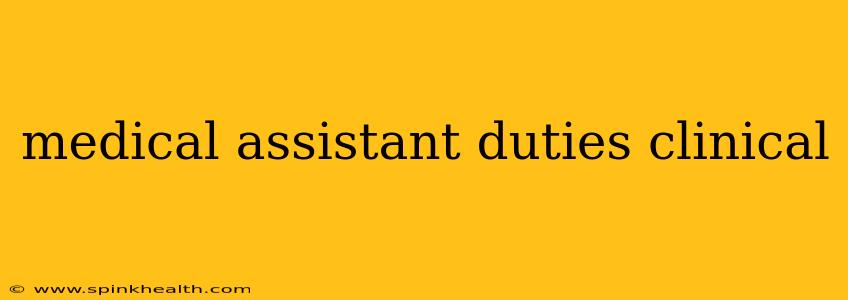The life of a medical assistant (MA) is anything but monotonous. It's a dynamic career path requiring a blend of technical skills, compassionate care, and unwavering dedication. While administrative tasks are a significant part of the job, clinical duties form the core of a medical assistant's role, often interacting directly with patients and contributing significantly to their well-being. Let's delve into the fascinating world of clinical medical assistant duties.
Imagine yourself starting your day in a bustling clinic. The first patient arrives, a nervous young woman with a persistent cough. Your day begins immediately.
Taking Vital Signs: The First Step
Before the doctor even enters the room, you're already actively involved. You greet the patient warmly, creating a comfortable atmosphere. Next, you meticulously take vital signs: temperature, blood pressure, pulse, and respiratory rate. You record these measurements accurately, ensuring they're clear and easily accessible for the physician. This seemingly simple task is critical for establishing a baseline and monitoring a patient's overall health.
Preparing the Patient and the Exam Room:
Following vital signs, you prepare the exam room. This involves not just tidying up but also ensuring all necessary instruments and supplies are readily available. This might include sterilizing equipment, preparing examination gloves and gowns, arranging the patient's chart, and ensuring the room is adequately stocked for the physician.
Assisting the Physician:
This is where the heart of clinical MA duties lies. You're not just an observer; you actively assist the physician during the examination. This might involve anything from handing instruments and supplies to taking notes, drawing blood, or performing EKGs. Your precision and attention to detail here are crucial to ensuring the efficiency and accuracy of the examination.
Performing Basic Clinical Procedures:
Many MAs are trained to perform certain clinical procedures independently, under the supervision of a physician. These might include:
- Phlebotomy: Drawing blood samples for various tests.
- Electrocardiograms (ECGs): Recording the electrical activity of the heart.
- Injections: Administering injections under the guidance of a physician.
- Wound care: Cleaning and dressing minor wounds.
- Specimen collection: Collecting samples for lab testing (urine, stool, etc.).
What are some common clinical tasks performed by a Medical Assistant?
This is a question frequently asked by aspiring MAs and those considering this career path. The truth is, the daily tasks vary depending on the medical setting (clinic, hospital, doctor's office) and the physician's specialty. However, many common threads run through the responsibilities:
- Preparing patients for exams: This includes explaining procedures and answering their questions, helping them get comfortable and undressed as needed.
- Sterilizing instruments: Maintaining a sterile environment is paramount to prevent infections.
- Assisting with minor procedures: This can range from suturing to wound care.
- Recording medical history: You play a crucial role in updating patient records with vital information gathered during the consultation.
What skills are needed to be a successful Clinical Medical Assistant?
Success in this field isn't just about technical skills. Strong interpersonal abilities are paramount. You must be able to:
- Communicate effectively: You’ll be interacting with patients, doctors, and other staff members regularly.
- Empathize with patients: Handling sensitive situations and providing reassurance requires empathy and compassion.
- Maintain composure under pressure: The clinic can get busy, demanding quick thinking and decisive action.
- Multitask efficiently: Managing various tasks simultaneously is an essential skill.
- Pay attention to detail: Accuracy is crucial in taking vital signs, administering medications, and documenting information.
How do I become a Medical Assistant?
Becoming a medical assistant typically involves completing an accredited medical assisting program. These programs offer both classroom learning and hands-on clinical experience, preparing you for the demands of this rewarding career.
The life of a clinical medical assistant is both demanding and rewarding. It's a career where you directly impact patients' lives, making a tangible difference in their health and well-being. It's a blend of technical proficiency, compassionate care, and a commitment to precision, all contributing to a career that is both fulfilling and vital to the healthcare system.

